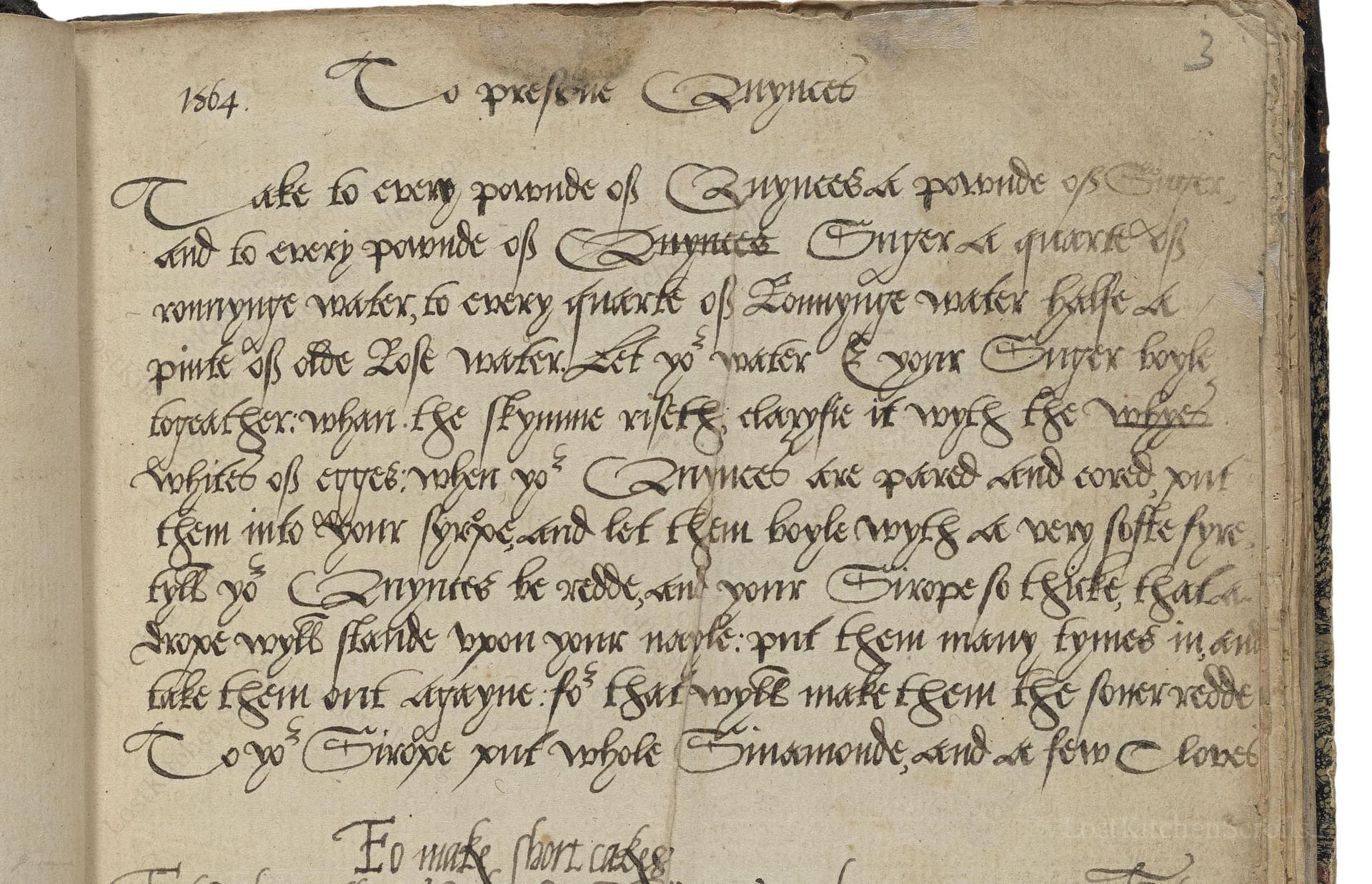To Preserve Quynces
From the treasured pages of Miscellany by a family in Ledbury, Herefordshire
Unknown Author

To Preserve Quynces
"Take to every pounde of Quynces a pounde of Suger, and to every pounde of Quynces Suger a quarte of ronnynge water, to every quarte of ronnynge water halfe a pinte of olde Rose water; Let your water & your Suger boyle togeather; when the skymme riseth, skymme it with the whyte of egges; when your Quynces are pared and cored, putt them into your syrope and let them boyle upon a very softe fyre tyll your Quynces be redde, and your Syrope so thicke that a drope wyll stande upon your nayle: putt them many tymes in and take them out agayne so that wyll make them the soner redde. To your Syrope put whole Sinamonde, and a fewe Cloves."
Note on the Original Text
The recipe is written in early modern English, with spellings like 'boyle', 'syrope', and 'Quynces' revealing the lack of standardized orthography at the time. Instructions are descriptive but presuppose familiarity with techniques such as clarifying syrup with egg white and boiling fruit until it 'be redde.' Rather than exact temperatures or timings, sensory cues such as color change and syrup consistency (a drop 'stande upon your nayle') guide the cook. Such open-ended recipes reflected the hands-on, experience-driven approach in early kitchens.

Title
Miscellany by a family in Ledbury, Herefordshire (1570)
You can also click the book image above to peruse the original tome
Writer
Unknown
Era
1570
Publisher
Unknown
Background
Step into the kitchens of the late Renaissance with this delightful historical culinary book, brimming with secrets, flavors, and recipes from the sixteenth century. Perfect for curious cooks eager to time travel via their taste buds.
Kindly made available by
Folger Shakespeare Library
This recipe for preserved quinces hails from England between 1550 and 1590, a period that saw the rise of sugar as a prized (and expensive) ingredient and the art of confitures taking root in wealthy households. Quince, with its fragrant perfume and ability to turn a deep crimson when cooked, was a fruit favored for preserves, especially on tables where culinary opulence was in vogue. The inclusion of rose water, cinnamon, and cloves reveals the influence of medieval and early modern flavors, where perfumed and spiced sweets represented both sophistication and status. Such preserved fruit would be served at banquets, feasts, or even as a medicinal delicacy, believed to aid digestion.

In the 16th century, cooks would have used heavy brass or copper pans over open hearth fires, tending the preserves with wooden spoons. Water was fetched, and rose water often prepared at home or sourced from apothecaries. Spoons or sieves (made from horsehair or linen) were used for skimming the syrup with beaten egg white. Jars would be stoppered and sometimes sealed with wax or parchment. The process required patience—low, even heat was maintained by moving pots to the cooler edge of the fire, and many cooks perched close to tend their precious preserves.
Prep Time
20 mins
Cook Time
2 hrs
Servings
10
We've done our best to adapt this historical recipe for modern kitchens, but some details may still need refinement. We warmly welcome feedback from fellow cooks and culinary historians — your insights support the entire community!
Ingredients
- 2.2 lb quinces (peeled, cored, and sliced)
- 2.2 lb granulated sugar
- 4 1/4 cups water
- 1 cup rose water (use high-quality culinary rose water)
- 1-2 sticks cinnamon
- 4-6 whole cloves
- 1 egg white (optional, for skimming/clarifying)
Instructions
- To recreate this beautiful quince preserve, start with peeled and cored quinces, weighing them carefully.
- For every 2.2 pounds of prepared quince, use 2.2 pounds of granulated sugar.
- For each 2.2 pounds of quince, add 4 1/4 cups of fresh water and 1 cup rose water.
- Gently boil the water and sugar together, removing any foam that appears with help from a beaten egg white (this clarifies the syrup, though you may skip or replace this step with modern skimming methods if desired).
- Slice your quinces and add them to the simmering syrup along with a stick of cinnamon and a few whole cloves.
- Over a very low heat, cook slowly until the quince turns a ruby red and the syrup thickens so a drop sits atop your fingernail (or until it reaches a soft set).
- Remove and return the quinces from the syrup a few times during cooking to help them color evenly.
- Transfer to sterilized jars and seal.
Estimated Calories
300 per serving
Cooking Estimates
It takes about 20 minutes to peel, core, and slice the quinces, and around 2 hours to gently simmer the preserve until the fruit turns ruby red and the syrup thickens. Each serving is full of flavors from the quince and rose water, with sweetness coming mainly from sugar.
As noted above, we have made our best effort to translate and adapt this historical recipe for modern kitchens, taking into account ingredients nowadays, cooking techniques, measurements, and so on. However, historical recipes often contain assumptions that require interpretation.
We'd love for anyone to help improve these adaptations. Community contributions are highly welcome. If you have suggestions, corrections, or cooking tips based on your experience with this recipe, please share them below.
Join the Discussion
Rate This Recipe
Dietary Preference
Main Ingredients
Culinary Technique

Den Bockfisch In Einer Fleisch Suppen Zu Kochen
This recipe hails from a German manuscript cookbook compiled in 1696, a time whe...

Die Grieß Nudlen Zumachen
This recipe comes from a rather mysterious manuscript cookbook, penned anonymous...

Ein Boudain
This recipe comes from an anonymous German-language manuscript cookbook from 169...

Ein Gesaltzen Citroni
This recipe, dating from 1696, comes from an extensive anonymous German cookbook...
Browse our complete collection of time-honored recipes



